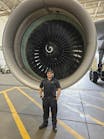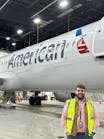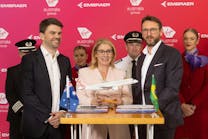Airlines Continue Opposition to PFCs as Bag Fee Collections Reach Historic Levels
Alexandria, VA - The holiday season has come early to U.S. air carriers that collected a record $1 billion in bag fees in the third quarter of 2015, according to data released Tuesday by the Department of Transportation. Despite collectively taking in more than $5 billion in fee revenue from bags and reservation changes or cancellations so far this year, the airlines continue to oppose adjustment to the local Passenger Facility Charge program that helps fund the construction of runways, terminals and other airport improvements.
"While the airlines have filled their stockings with more than $1 billion in quarterly bag fee revenues, they continue to play the Grinch when it comes to airport local self-help to build better facilities for the traveling public," AAAE President and CEO Todd Hauptli said. "The carriers' continued position of 'Bah Humbug' when it comes to modernizing the local Passenger Facility Charge program runs contrary to the interests of the traveling public - a fact made very clear as passengers take to the skies during the busy holiday season."
According to data released by the Department of Transportation's Bureau of Transportation Statistics yesterday, airlines collected more than $1 billion in baggage fees during the third quarter of 2015, the highest amount of any quarter to date and the first quarter where bag fee collections exceed the $1 billion mark. Airlines collected another $755 million in reservation change or cancellation fees.
Airlines have collected more than $5 billion in bag and ticket change fees through the first three quarters of 2015, which follows a record $3.5 billion in bag fees and another $3 billion in reservation cancellation or change fees collected in 2014.
Since 2008, airlines have collected more than $23.8 billion in baggage fees and nearly $19.4 billion extra in ticket change and cancellation fees. That total of more than $43.2 billion in baggage and ticket change fees does not include other airline ancillary charges such as pet transportation, sale of frequent flyer award miles to airline business partners and standby passenger fees.
In comparison, last year airports collectively received less than $2.9 billion from the PFC, which is a charge that must be justified locally, imposed locally and used locally on FAA-approved projects that enhance local airport facilities. The federal cap on the local PFC has not been adjusted since 2000. The PFC is not a tax and never goes to the federal Treasury, a fact validated by the non-partisan Congressional Research Service. The $5 billion in bag fees, reservation change charges and other ancillary revenue collected by the carriers through the first nine months of 2015 also exceeds the $3.35 billion the federal government provided for airport grants at all eligible airports across the country in FY 2015 through the Airport Improvement Program.
Because bag fees are not taxed at the same 7.5 percent excise tax rate applied to base airline tickets, the Airport and Airway Trust Fund has lost more than $200 million in foregone revenue already this year. Since 2008, the $23.8 billion in bag fees that are not taxed have cost the Trust Fund approximately $1.8 billion in lost revenue. Those are funds that could have otherwise been spent on needed airport and air traffic control upgrades.
ABOUT AAAE: Founded in 1928, AAAE is the world's largest professional organization representing the men and women who work at public-use commercial and general aviation airports. AAAE's 5,000-plus members represent some 850 airports and hundreds of companies and organizations that support the airport industry. Headquartered in Alexandria, Va., AAAE serves its membership through results-oriented representation in Washington, D.C., and delivers a wide range of industry services and professional development opportunities, including training, conferences, and a highly respected accreditation program.



